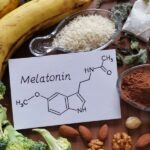The internal circadian clock in mammals drives whole-body biological activity rhythms. The clock reflects changes in external signals by controlling enzyme functions and the release of hormones involved in metabolic processes. Thus, misalignments between the circadian clock and an individual’s daily schedule are recognized to be related to various metabolic diseases, such as obesity and diabetes. Although evidence has shown the existence of a complex relationship between circadian clock regulation and daily food intake, the regulatory effects of phytochemicals on the circadian clock remain unclarified. To better elucidate these relationships/effects, the circadian system components in mammals, circadian misalignment-related metabolic diseases, circadian rhythm-adjusting phytochemicals (including the heterocycles, acids, flavonoids and others) and the potential mechanisms (including the regulation of clock genes/proteins, metabolites of gut microbiota and secondary metabolites) are reviewed here. The bioactive components of functional foods discussed in this review could be considered potentially effective factors for the prevention and treatment of metabolic disorders related to circadian misalignment.
–Junqing Huang, Muwen Lu, Chi-Tang Ho
*published in Food & Function 31 May 2021












